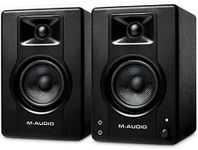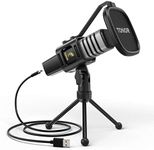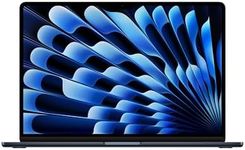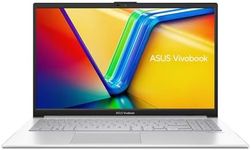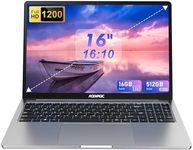Buying Guide for the Best Laptop For Music Production
When choosing a laptop for music production, it's important to focus on the specifications that will support your software and workflow efficiently. Music production can be resource-intensive, requiring a balance of processing power, memory, and storage to handle complex projects and multiple tracks. Consider your specific needs, such as the type of music you produce, the software you use, and whether you plan to record live instruments or work primarily with digital audio. This will help you determine which features are most important for your setup.Processor (CPU)The processor, or CPU, is the brain of your laptop and is crucial for running music production software smoothly. A powerful CPU can handle multiple tracks, effects, and virtual instruments without lag. CPUs are typically divided into segments like dual-core, quad-core, and hexa-core. For music production, a quad-core or higher is recommended, as it provides the necessary power for multitasking and running demanding applications. If you work with large projects or use CPU-intensive plugins, opt for a higher core count and faster clock speed to ensure smooth performance.
RAMRAM, or Random Access Memory, is important for loading and running your music production software and projects. More RAM allows you to work with larger projects and more plugins simultaneously. Laptops typically come with 8GB, 16GB, or 32GB of RAM. For basic music production, 8GB might suffice, but for more complex projects or professional work, 16GB or more is recommended. If you use a lot of sample libraries or virtual instruments, consider opting for 32GB to ensure you have enough memory to handle everything smoothly.
StorageStorage is where all your files, software, and projects are saved. There are two main types: HDD (Hard Disk Drive) and SSD (Solid State Drive). SSDs are faster and more reliable, making them ideal for music production as they reduce load times and improve overall system responsiveness. Consider a laptop with at least 512GB of SSD storage to accommodate your software and projects. If you work with large sample libraries or have extensive audio files, you might need 1TB or more. You can also use external drives for additional storage if needed.
Audio Interface CompatibilityAn audio interface is essential for connecting microphones, instruments, and other audio equipment to your laptop. Ensure that the laptop you choose has the necessary ports and compatibility with your audio interface. USB and Thunderbolt are common connection types. If you already own an audio interface, check its compatibility with the laptop's ports. If you're planning to buy one, consider the type of connections you need and ensure the laptop supports them. This will ensure seamless integration with your music production setup.
Display and ResolutionA good display is important for music production as it allows you to see your tracks and plugins clearly. Look for a laptop with a high-resolution display, such as Full HD (1920x1080) or higher, to ensure clarity and detail. A larger screen size, like 15 inches or more, can also be beneficial for viewing multiple tracks and plugins simultaneously. If you often work on the go, consider a balance between screen size and portability. A high-quality display will make your workflow more efficient and enjoyable.
Battery LifeBattery life is important if you plan to work on music production while traveling or away from a power source. A laptop with longer battery life allows you to work uninterrupted for extended periods. Look for laptops that offer at least 6-8 hours of battery life under normal usage. Keep in mind that intensive tasks like music production can drain the battery faster, so having a laptop with good battery management features can be beneficial. If you primarily work in a studio setting, battery life may be less of a concern.
